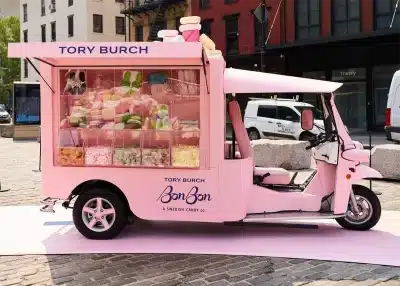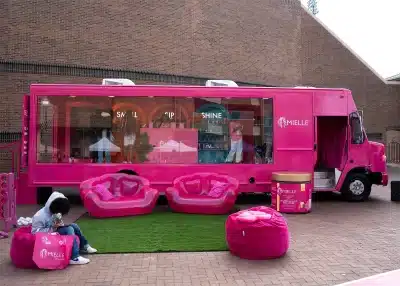
New Year, New Opportunities: How Promotional Trucks Can Transform Your Marketing in 2026
As 2026 kicks off, brands across the country are looking for fresh, high‑impact ways to stand out in a crowded marketplace. Not only is traditional
As the name suggests, nostalgia marketing is a marketing strategy that leverages nostalgia for company or brand growth. Nostalgia, “a sentimental longing or wistful affection for the past, typically for a period or place with happy personal associations,” can be a great tool because plainly, it taps into the emotions of consumers and has a long-lasting effect.
Simply put, nostalgia marketing focuses on connecting your brand with positive concepts or feelings from the past that your target audience shares. By doing so, the idea is that the consumer associates your brand with feelings of joy, comfort, security, and other positive emotions, thereby making it easier for them to get on board with your product or service.
As vaguely mentioned before, nostalgia marketing is successful because it creates an emotional connection between your brand and the consumer. When you think about it, it’s pretty straightforward: associating your company with something consumers already love makes it easier for them to love you, too.
And this hasn’t gone untested. There are studies that show how tapping into people’s memories can have a significant impact on their mental health in general, and transitively, brand awareness and loyalty.
In general, nostalgia helps counteract boredom, loneliness, and anxiety. Even more specifically to nostalgia marketing, a recent study found that more than half of consumers are finding comfort in old TV shows, films, and songs from their youth. This presents an opportunity for content marketing that brings the user down memory lane and creates a positive experience for potential subscribers rather than simply berating them with advertising.
One study even showed that participants were willing to sacrifice a more tangible reward, money, in order to reminisce about fond memories and positive past experiences.
The finding suggests that recalling positive autobiographical memories is intrinsically valuable, which may be adaptive for regulating positive emotion and promoting better well-being.
In turn, what this means is that as a brand or company, if you’re able to implement positive past experiences into a marketing campaign, you’re more likely to see tangible results and growth.
To make this less abstract, below we have provided some past examples of nostalgia ads and/or campaigns that have proven to be successful.
Aside from the iconic polar bear, one of the most famous Coca Cola campaigns is the annual depiction of Santa Claus enjoying a refreshing bottle of Coca Cola. By linking their brand with the image of Santa Claus, the company leverages childhood memories of Christmas with their brand, which inherently evokes an emotional response and positive affiliations that are beneficial to the company at large.
In order to effectively market their grocery pickup service, Walmart also turned to nostalgia marketing. The retail giant used pop culture vehicles like Jurassic Park Explorer, Cinderella’s pumpkin carriage, and the Mystery Machine from Scooby Doo as a way of creating a positive connection between consumers and their new service.
By emphasizing that Johnny Doughnuts uses classic recipes from the 1920s, Johnny Doughnuts also successfully utilizes nostalgia marketing. Nothing cuts through the noise than classic glazed donuts.
Make no mistake, Stranger Things uses the fact that it’s set in the 80s to its advantage. Advertisements for the series do not shy away at all from depicting big hair, leg warmers, and other quintessential 80s things. This, of course, keeps the series more appealing to an audience that grew up in and/or remembers that decade.
Want an example of nostalgia marketing in web design? Check out this quick guide from adobe on how to make a nostalgic typestyle!
Though examples of nostalgia marketing can increase your understanding of nostalgia marketing as a whole and show you how you may have seen it in your life, providing just examples may not give you the insight you need to use nostalgia marketing in your own business.
In other words, you still may not feel that you have the proper tools to apply this for your own benefit. Here are some tips on how to use nostalgia marketing to increase brand awareness and loyalty.
Firstly, it’s important to know who your audience is before you can identify memories relevant to that specific group of people. Let’s say you’re a burger company targeting Millennials and the older side of Gen Z. You might think of popular TV shows, songs, movies, public figures, etc. during the time this demographic was growing up.
There are many possibilities, but one that comes to mind is ‘who lives in a pineapple under the sea?’ SpongeBob Squarepants. With that popular culture reference in mind, you might see an opportunity to connect your brand to the Krusty Krab as an effective marketing strategy.
Like many different marketing strategies, nostalgia marketing works best when you find the right occasion to use it.
For instance, if your company is rebranding, launching a product, opening a store, reaching a year milestone, etc., then it’s a great time to consider leveraging an emotional connection to grow and support your brand.
Trust, happiness, belonging, and value are all emotions that inspire people to buy your product or service. With that being said, these emotions are evoked best in a catchy hook that is memorable. Think Pepsi’s, ‘stronger together.’
Nostalgia marketing campaigns don’t even need to be as specific as referencing pop culture such as your childhood tamagotchis, as shown with McDonald’s’ reboot of their classic 90’s packaging and combo meals, referencing simpler times in collaboration with music artist Travis Scott.
Ah yes, social media marketing. Few approaches are as new and impactful for growing your brand name and following than using social media. Using nostalgia paired with common social media marketing tactics like assuming a hashtag for something like a “throwback thursday”, or #tbt, to relate the positive memories of your users with comfort food from that era, or simply just a pop culture phenomenon that you can tie back into your brand, resonates more with your target audience than just a simple retargeting ad intrusively showing up in the sidebar.
Because the use of social media is so widespread and frequent, it’s the perfect platform for you to try out nostalgia marketing and see the reach it can have. Whether it be an appeal to an aesthetic on Instagram or a call back to a nostalgic time on LinkedIn, forming an emotional connection on social media is an important piece of the puzzle.
Hopefully what you’ve read has left you with a better idea of what nostalgia marketing is, how it’s been used in the past, and above all, inspired you in some way to implement this approach in your own marketing tactics.
Marketing, and especially nostalgia marketing, is all about connecting with consumers in a way that’s different and impactful. So, as you’re thinking about your next brand promotion or campaign, don’t underestimate the effect that positive memories can get a consumer on your side.
To learn more about how Food Truck Promotions can help you in your future marketing endeavors, contact us.

As 2026 kicks off, brands across the country are looking for fresh, high‑impact ways to stand out in a crowded marketplace. Not only is traditional

With COVID-19 affecting our face-to-face interactions, virtual events have become the new way to execute experiential marketing events. Check out how you can implement well-executed

In today’s fast-paced marketing landscape, brands are constantly searching for innovative ways to engage audiences and leave a lasting impression. Traditional advertising channels still have